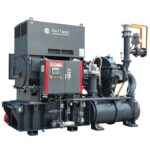Selecting the right air compressor is critical for businesses to optimize productivity and reduce operational costs. Whether you’re running a manufacturing plant, a construction site, or a medical facility, the choice of an air compressor can significantly impact your overall efficiency and energy consumption. This guide outlines the 6 most important factors to consider when choosing an air compressor.
1. Clarify Your Air Compressor Needs
1.1 Gas Consumption Requirements
The first step in choosing an air compressor is determining your gas consumption. This is usually measured in cubic meters per minute (m³/min). Consider the total demand of all air-powered equipment in your operation and factor in a margin of 10%–20% to account for future growth or peak consumption needs.
1.2 Gas Pressure Requirements
Different equipment may have different pressure requirements for compressed air. Common pressure ranges are between 0.4 MPa to 1.25 MPa. It’s essential to select an air compressor that can provide sufficient pressure to meet the demands of all connected equipment. A general rule is to choose a compressor with a rated pressure 10%-20% higher than the maximum operating pressure.
1.3 Compressed Air Quality
For industries like food processing, pharmaceuticals, and electronics, air quality is critical. Air compressors for such applications should be capable of producing high-quality, clean air. Make sure to select a compressor that can meet these needs by adding filters, dryers, or oil-free models if required.

2. Select the Right Type of Air Compressor
Choosing the right type of air compressor depends on your application. Here are the most common options:
2.1 Piston Air Compressors
-
Advantages: Simple structure, low initial cost, easy to maintain.
-
Disadvantages: High noise levels, frequent maintenance, less reliable for continuous use.
-
Best for: Small factories or labs with low air demand.
2.2 Screw Air Compressors
-
Advantages: Stable operation, low noise, energy-efficient, long service life.
-
Disadvantages: Higher initial investment.
-
Best for: Medium and large-scale operations with consistent air demand.
2.3 Centrifugal Air Compressors
-
Advantages: High airflow, high efficiency, stable, low noise.
-
Disadvantages: Requires high-quality air, high initial cost, slow start-up.
-
Best for: Large industrial facilities (e.g., chemical plants, power plants).
2.4 Vortex Air Compressors
-
Advantages: Compact, low noise, energy-efficient.
-
Disadvantages: Limited flow and pressure capabilities.
-
Best for: Small spaces like medical or laboratory environments.
2.5 Oil-Free Air Compressors
-
Advantages: Provides clean, oil-free air, ideal for sensitive applications.
-
Disadvantages: High maintenance costs, higher initial cost.
-
Best for: Industries like food, pharmaceuticals, and electronics where air purity is critical.
3. Consider Operating Costs
3.1 Energy Efficiency
The energy consumption of an air compressor is one of its largest operational costs. By selecting an energy-efficient model, you can significantly lower your long-term expenses. Always look for energy efficiency ratings or consult with the supplier about the compressor’s power usage.
3.2 Maintenance Costs
Each type of air compressor has different maintenance requirements. Piston compressors are simple but require frequent service, while screw and centrifugal models offer longer intervals between servicing but tend to have higher maintenance costs. Be sure to consider both upfront costs and ongoing maintenance costs when making your decision.
3.3 Lifespan and Reliability
The service life of an air compressor directly impacts its overall cost of ownership. High-quality brands typically offer longer lifespans and more reliable operation, which can reduce the frequency of repairs and replacements.
4. Installation Environment Considerations
4.1 Space Requirements
Make sure to consider the space required for installing your air compressor. You’ll need enough room for both operation and maintenance. Ensure the compressor is installed in a well-ventilated area for optimal performance.
4.2 Ventilation and Temperature Control
During operation, air compressors can generate a lot of heat. Choose a location with good ventilation and airflow to prevent the compressor from overheating, ensuring it remains efficient.
4.3 Noise Levels
Air compressors can be noisy, particularly piston models. For noise-sensitive environments, look for low-noise models or implement soundproofing to minimize disruption.

5. Ensure Safety and Reliability
5.1 Safety Features
Select an air compressor equipped with safety devices such as overload protection, pressure controls, and safety valves. These features will ensure safe and uninterrupted operation of the system.
5.2 Brand Reputation and After-Sales Service
Opt for well-established brands known for their reliable products and after-sales support. Choose a supplier who offers timely technical support and has a readily available supply of spare parts.
5.3 Automated Control Systems
Modern air compressors come with automated control systems that allow for remote monitoring, fault diagnosis, and automatic adjustments. These systems improve efficiency and can prevent operational disruptions.
6. Scalability and Flexibility
6.1 Modular Design
Look for compressors with modular designs, allowing for easy upgrades or adjustments as your air demand increases in the future. This flexibility ensures your compressor can grow with your business.
6.2 Parallel Operation of Multiple Compressors
If your operations experience significant fluctuations in air demand, you might consider setting up multiple compressors to operate in parallel. This setup allows for intelligent control and optimal load distribution, enhancing overall system efficiency and reliability.
Conclusion: Choosing the Right Air Compressor for Your Business
Selecting the right air compressor involves a comprehensive assessment of your specific needs. By considering factors like gas consumption, pressure requirements, operating costs, and installation conditions, you can make an informed decision that will ensure long-term efficiency and cost savings for your business.
Investing in the right air compressor today can pay off by improving performance, minimizing downtime, and reducing overall operational expenses.


